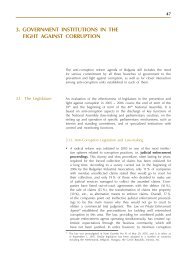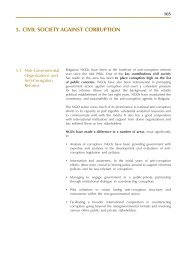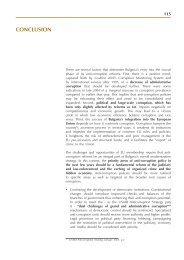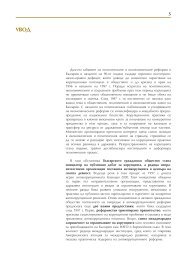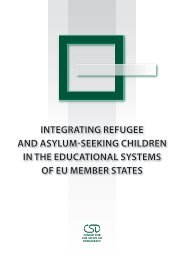National Threat Assessment 2008. Organised Crime - Politie
National Threat Assessment 2008. Organised Crime - Politie
National Threat Assessment 2008. Organised Crime - Politie
You also want an ePaper? Increase the reach of your titles
YUMPU automatically turns print PDFs into web optimized ePapers that Google loves.
2.6.6 <strong>Crime</strong>-related factors and expectations<br />
Policy and regulation<br />
The factor that will most determine future developments in the nature and scale<br />
of human trafficking is (changing) government policy and the regulation thereof.<br />
One issue is that, since the ban on brothels was lifted in 2000, the regulation of<br />
the prostitution sector has not been specified in an unambiguous manner. An<br />
escort service, for example, may require a licence in some municipalities but not<br />
in others. Another aspect is that forms of prostitution that do not involve a fixed<br />
location, such as escort prostitution, are not (or cannot be) monitored as<br />
intensively as forms of prostitution where a fixed location is involved. Although<br />
exploitation can occur everywhere, there is an increased risk of exploitation in<br />
these less monitored situations.<br />
Relatively little is known about exploitation in sectors other than the sex<br />
industry. Due to the fact that exploitation in other sectors was only made a<br />
specific criminal offence in 2005, the alertness to signs is still limited.<br />
Intensifying investigative and monitoring activities in this area in the future is<br />
expected to result in an increase in the number of detected cases of other<br />
forms of exploitation.<br />
The exploitation of Romanian and Bulgarian Roma (children) may also increase in<br />
the years to come. Bulgarian Roma begging and working as prostitutes seems to<br />
be more of a problem in Belgium than in the Netherlands. Possible intensification<br />
of Belgian measures to combat the criminal activities of Roma could result in an<br />
increase in this problem in the Netherlands. It seems advisable to continue to<br />
closely monitor Belgian policy with regard to the criminal activities of Roma.<br />
Expansion of the European Union and the Schengen area<br />
EU expansion has resulted in a substantial increase in the number of (labour)<br />
migrants from Poland, Romania and Bulgaria. Neighbouring countries have<br />
seen an increase in the number of victims – and sometimes also the number of<br />
perpetrators – of human trafficking from these new member states. The asylum<br />
procedure in the Netherlands has shown to be vulnerable to (potential) victims<br />
of human trafficking being smuggled in for exploitation both in the Netherlands<br />
and abroad. The expansion of the EU does not mean that illegal employment<br />
and/or exploitation will stop. Shifts will occur in the victims’ countries of origin,<br />
but vulnerable groups will still exist.<br />
72 <strong>National</strong> <strong>Threat</strong> <strong>Assessment</strong> 2008 – <strong>Organised</strong> crime



